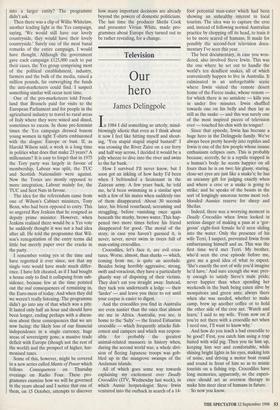Television
Our hero
James Delingpole
In 1984 I did something so utterly, mind- blowingly idiotic that even as I think about it now I feel like hitting myself and shout- ing, 'You stupid stupid stupid bastard!' I was crossing the River Zaire on a car ferry and half way across, I decided it would be a jolly wheeze to dive into the river and swim to the far bank.
How I survived I'll never know, but I soon got an inkling of how lucky I'd been when I befriended a lieutenant in the Zairean army. A few years back, he told me, he'd been swimming in a similar spot with a few of his mates when suddenly one of them disappeared. About 30 seconds later, his friend resurfaced, screaming and struggling, before vanishing once again beneath the murky, brown water. This hap- pened two more times before his friend disappeared for good. The moral of the story, in case you haven't guessed it, is never, never, never swim in rivers full of man-eating crocodiles.
Crocodiles, let's face it, are evil crea- tures. Worse, almost, than sharks — which, coming from me, is quite an accolade. Besides being horribly aggressive, strong, swift and voracious, they have a particularly ghastly way of disposing of their victims. They don't eat you straight away. Instead, they tuck you underneath a ledge — their 'larder' — and leave you there to rot until your corpse is easier to digest.
And the crocodiles you find in Australia are even nastier than the ones that almost ate me in Africa. Australia, you see, is home to the 'Salty' — the feared Estuarine crocodile — which frequently attacks fish- ermen and campers and which was respon- sible for probably the greatest animal-related massacre in history when, during the second world war, a whole divi- sion of fleeing Japanese troops was gob- bled up in the mangrove swamps of the Andaman islands.
All of which goes some way towards explaining my excitement over Deadly Crocodiles (ITV, Wednesday last week), in which Aussie herpetologist Steve Irwin ventured into the outback in search of a 14- foot potential man-eater which had been showing an unhealthy interest in local tourists. The idea was to capture the croc and, instead of following normal Australian practice by chopping off its head, to train it to be more scared of humans. It made for possibly the second-best television docu- mentary I've seen this year.
The best documentary, in case you won- dered, also involved Steve Irwin. This was the one where he set out to handle the world's ten deadliest snakes, all of which conveniently happen to live in Australia. It culminated in an unforgettable scene where Irwin visited the remote desert home of the Fierce snake, whose venom — for which there is no antidote — kills you in under five minutes. Irwin shuffled towards one on his belly and then lay as still as the snake — and this was surely one of the most inspired pieces of television ever — touched his chin with its tongue!
Since that episode, Irwin has become a huge hero in the Delingpole family. We've always been pretty heavily into reptiles and Irwin is one of the few people whose insane enthusiasm eclipses ours. This is probably because, secretly, he is a reptile trapped in a human's body: he seems happier on all fours than he is on two; his glassy, staring, close-set eyes are just like a snake's; he has an uncanny gift for judging exactly when and where a croc or a snake is going to strike; and he speaks of the beasts in the sort of longingly amorous terms most red- blooded Aussies reserve for sheep and Sheilas.
Indeed, there was a worrying moment in Deadly Crocodiles when Irwin looked in serious danger of making a pass at a 'gor- geous' eight-foot female he'd seen sliding into the water. Only the presence of his wife Terri, I suspect, prevented Irwin from embarrassing himself and us. This was the first time we'd met Terri. My brother, who'd seen the croc episode before me, gave me a good idea of what to expect. 'She's exactly the sort of wife you'd imagine he'd have.' And sure enough she was: pret- ty enough to satisfy Steve's male pride; never happier than when spending her weekends in the bush being eaten alive by mosquitoes and green ants; always there when she was needed, whether to make camp, brew up another coffee or to hold the other side of the croc net. 'Watch and learn,' I said to my wife. 'From now on if you're not there with a crocodile net when I need one, I'll want to know why.'
And how do you teach a bad crocodile to be good? First, you catch him using a trap baited with wild pig. Then you tie him up, keeping him wet and comfortable, while shining bright lights in his eyes, making lots of noise, and driving a motor boat round and round in front of him so as to mimic tourists on a fishing trip. Crocodiles have long memories, apparently, so the experi- ence should act as aversion therapy to make him steer clear of humans in future.
So now you know.


































































 Previous page
Previous page